HYBRID TEACHING: Empowering Educators for the Future is a 2-year-long project, funded by the European Commission, projected to empower academic staff for flexible hybrid teaching and institutionalize knowledge through a micro-certification system.
The four project partners are committed to develop activities that will certainly improve hybrid teaching, ensuring equitable learning experience for both offline and online learners, contribute to increasing integrity of students with fewer opportunities, enhance teachers' professional development and innovation in education through experiments with new pedagogical approaches.
Empower academic staff for flexible hybrid teaching and institutionalize knowledge through a micro-certification system;
Improve teaching and learning in hybrid classrooms and provide continuous professional development opportunities.
Increase academic staff competency in hybrid teaching;
Improve didactical performance in online environment;
Improve students' learning experience and outcomes;
Increased institutional capacity for blended mobility and educational innovation.
There are four Workpackages (WP) in Hybrid Teaching, each is led by one of the partners. Due to its acknowledge experience in microcredential systems, partner
Stichting NHL Stenden (Netherlands), provides consultancy in Workpackages 2 and 3.
LEADING PARTNER: VIKO (Lithuania)
VIKO is responsible for the Project’s overall management. Facilitates internal communication, monitors project progress and costs, coordinates activities on risk and quality management.
LEADING PARTNER: EUF (Germany)
EUF coordinates research on user profile, development and later testing of 6 micro-credentials on hybrid teaching. Due to solid experience in micro-credentialing, Partner NHLS (NL) will offer a framework for micro-credentials.
LEADING PARTNER: VIKO (Lithuania)
VIKO coordinates discussions and development of the micro-certification frameworks. Due to important previous experience, NHLS (NL) contributes in framework development.
LEADING PARTNER: ATEC (Portugal)
ATEC is responsible for developing the Communication and Sustainability Plan, project logo and visual for the digital badge, set up project’s social media and web pages.
All Partners contribute for this WP.
Leading Partner: EUF (Germany)
Leading Partner: EUF (Germany)
Leading Partner: NHL Stenden (NL)
Leading Partner: VIKO (LT)
Leading Partner: VIKO (LT)
Leading Partner: ATEC (PT)
Each of the micro-modules awards a digital badge upon successful completion. Participants who complete all six Hybrid Teaching micro-modules earn a prestigious Golden Badge,
recognizing their full achievement in the program. Badges are issued by the training entity in whisch training is attended.
Hybrid Teaching project partners in Lithuania, Germany, Netherlands and Portugal are Higher Education Institutions and Vocational Education and Training providers. All partners are largely experienced in hybrid teaching and learning formats and all bring expertise and knowledge to help achieve project's aims and outcomes.
Meet the partners and their role in the project!
Learn more: https://en.viko.lt
The Institute of Vocational Education, Work and Technology (short: EUF-BIAT) trains vocational education teachers in the fields of Metals-, Electrical-, Automotive- and Information Technology and deals with issues regarding the development of technology, (skilled) work and vocational training from a vocational education and an educational scientific point of view.
An educational, didactic and scientific expertise in the fields of digitalization and media education is therefore already available by function and is proven by the projects already carried out at the institute.
The EUF Team is part of the Erasmus Project CityGo which enriched the competence in the development of online learning scenarios especially collaboration in online communities.
Learn more: www.uni-flensburg.de
NHL Stenden University of Applied Sciences is a multi-campus, profession-oriented.
The InnovationLab of the Academy for secondary and vocational education is the NHL Stenden department that participates in this project. The InnovationLab is a dynamic unit driving innovation in education and beyond. It serves as a catalyst for creativity, experimentation, and interdisciplinary collaboration.
With a focus on practical solutions and real-world impact, NHL Stenden InnovationLab is at the forefront of shaping tomorrow's teachers, leaders and innovators.The InnovationLab staff members have taken part in a number of national and international projects on media literacy and digital citizenship and offer professional development courses about these topics.
Learn more: https://innovationlab.nhlstenden.com/
ATEC is a Vocational Training Academy dedicated to the development of training courses, EQF level 4 and 5, for young people and adults and to the development of skilling, upskilling and reskilling training programs for active employees.
The academy is the result of a project designed and promoted by Volkswagen Autoeuropa, Siemens, Bosch and AHK with the support of the Portuguese State. ATEC’s portfolio is mainly industry-oriented, with courses in the technical areas such as mechanics, automotive, automation and robotics, sustainable energies and IT areas, but also in the behavioral and continuous improvement areas.
ATEC has about 1500 trainees daily. Courses are delivered mostly face-to-face, however there is a growing tendency to online and blended training.
Learn more: www.atec.pt
All materials are released under a Creative Commons BY-SA 4.0 licence—feel free to reuse, adapt, and redistribute with attribution.
Download the worksheets below and see how a few focused prompts can streamline your next hybrid session. Questions or success stories? Drop us a note in the forum or tag us on social with #HybridTeachingToolkit
The purpose of this worksheet is to map learning outcomes, tools, and accessibility checks in one place.
Typical use time - 10 minutes
To structure group tasks with forums, wikis, or Teams channels.
Typical use time - 15 minutes
It can be used to balance synchronous touch-points with self-paced options.
Typical use time - 10 minutes
Purpose is to build rubrics and plan 48-hour feedback cycles.
Typical use time - 12 minutes
To capture weekly wins, challenges, and peer-learning goals
Typical use time - 8 minutes
Create rapid low-stakes quizzes or polls that give students instant feedback and give you a snapshot of understanding.
Typical use time - 8 minutes
Define summative outputs and build transparent marking rubrics in Moodle or Teams.
Typical use time - 15 minutes
Pull learning analytics (Moodle Reports, Teams Insights) and turn them into actionable teaching tweaks.
Typical use time - 12 minutes
Deliver audio/video or peer-driven feedback efficiently within a 48-hour turnaround.
Typical use time - 10 minutes
Spot at-risk students early and plan timely interventions to re-engage them.
Typical use time - 10 minutes
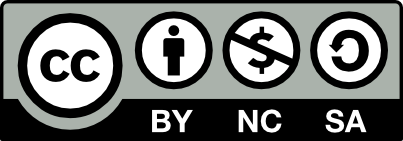
However, please make sure to:
All Hybrid Teaching resources are released under a CC BY-NC-SA license, which means:
Furthermore, following Disclaimer must be used:
"Funded by the European Union. However, the views or opinions expressed are those of the author(s) alone and do not necessarily reflect those of the European Union or of National Agency - Education Exchanges Support Foundation, Lithuania. Neither the European Union nor National Agency - Education Exchanges Support Foundation, Lithuania can be held responsible for them."
Get to know our events - click on the image for details
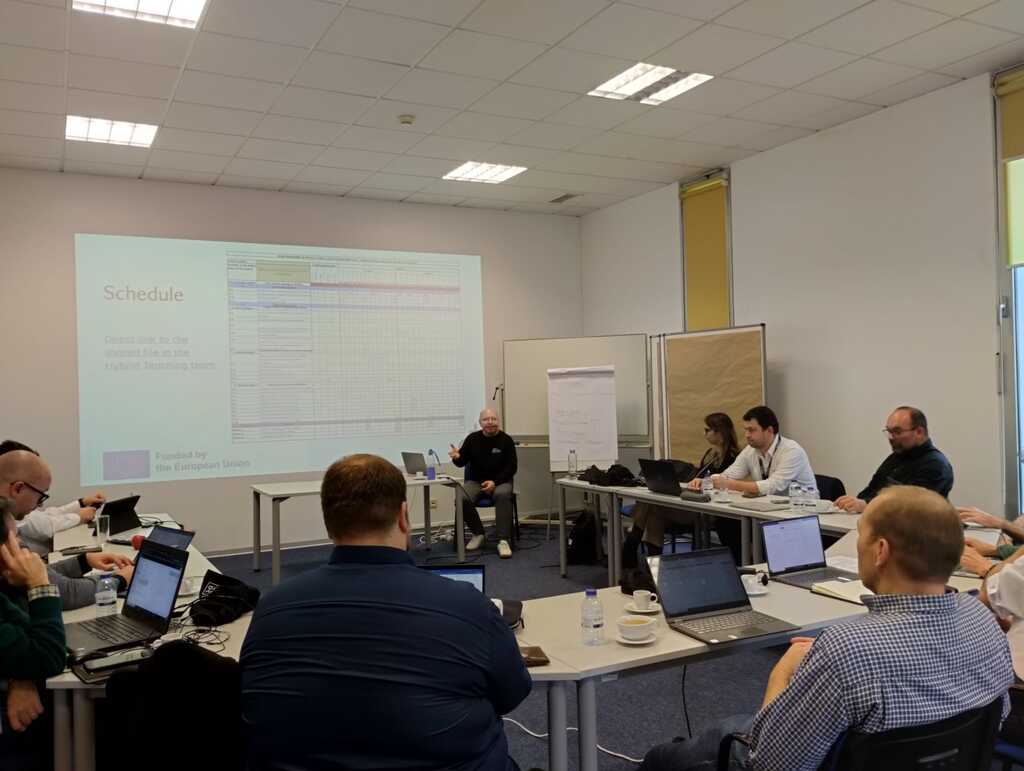
1st Partner Event - Portugal
The first multiplier event took place on November 28th, 2003, at the premises of ATEC, in Portugal and brought the first ideas on the development of the Hybrid Teaching Project. During this first gathering, besides getting to know eachother, the Partners established the project’s main guidelines, key tasks, and visual identity.
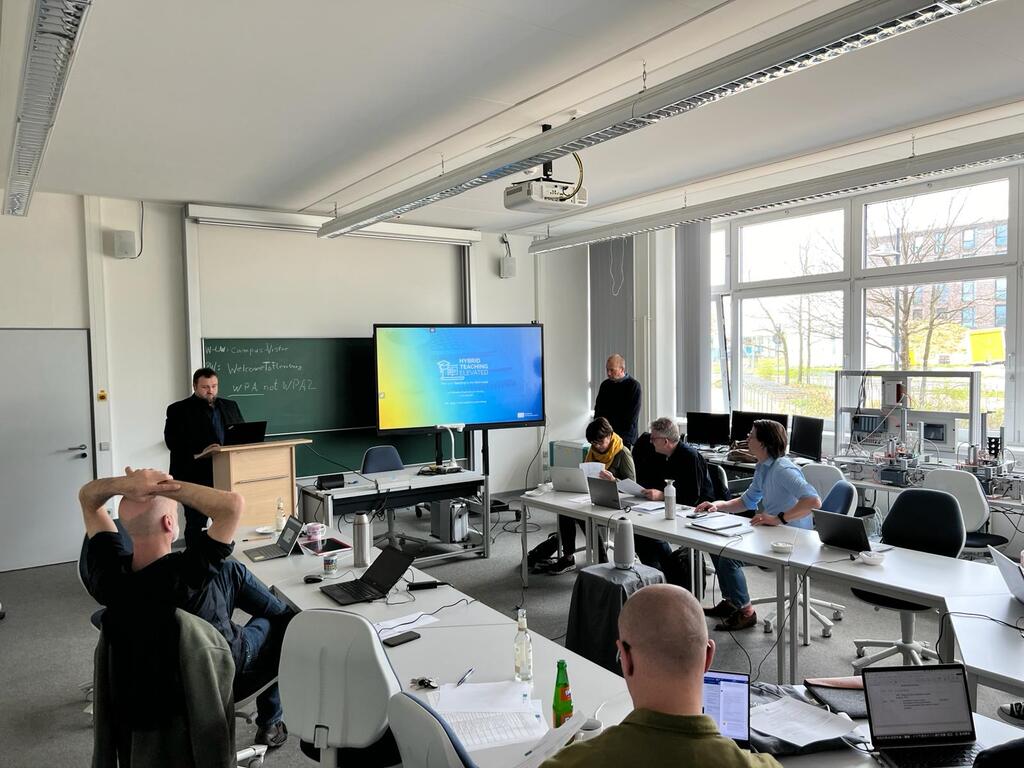
2nd Partner Event - Germany
The second Partners’ Meeting took place at Flensburg University in Germany, in April 2024. During this meeting, partners reviewed the project’s progress and exchanged ideas, experiences, and insights on hybrid learning and tecahing — key elements for the successful development of the training modules.
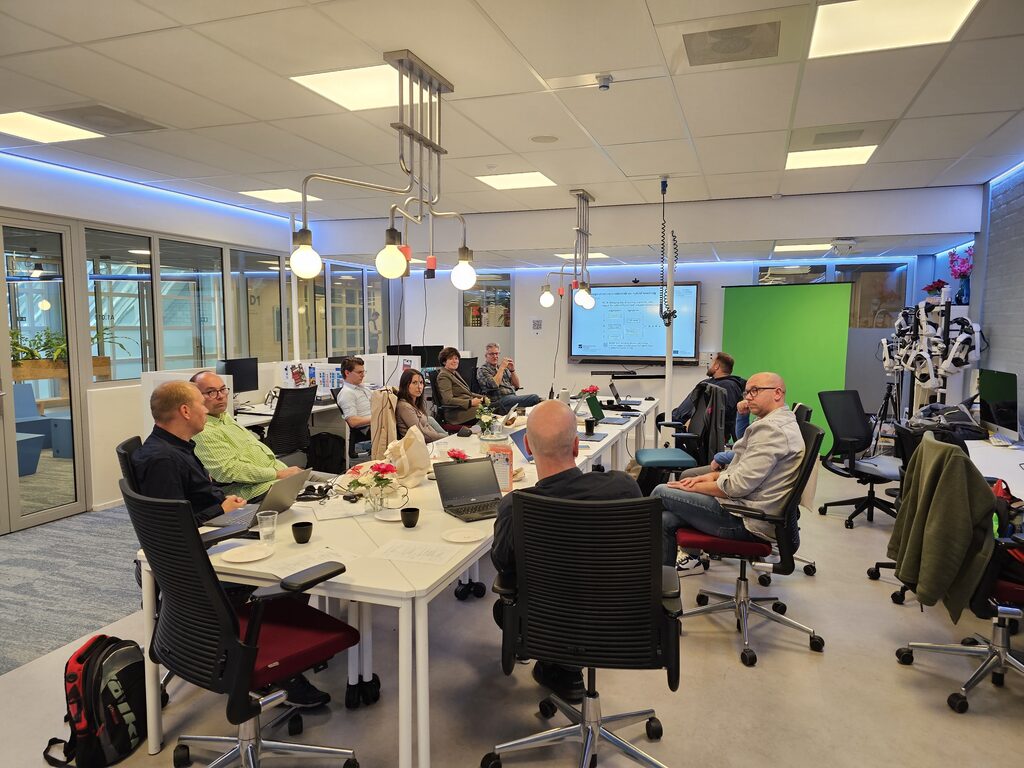
3rd Partner Event - The Netherlands
In October 2024, the Partners met at the premises of NHL Stenden in Leuuwarden, The Netherlands. Badges and Modules were presented, discussed and improved.
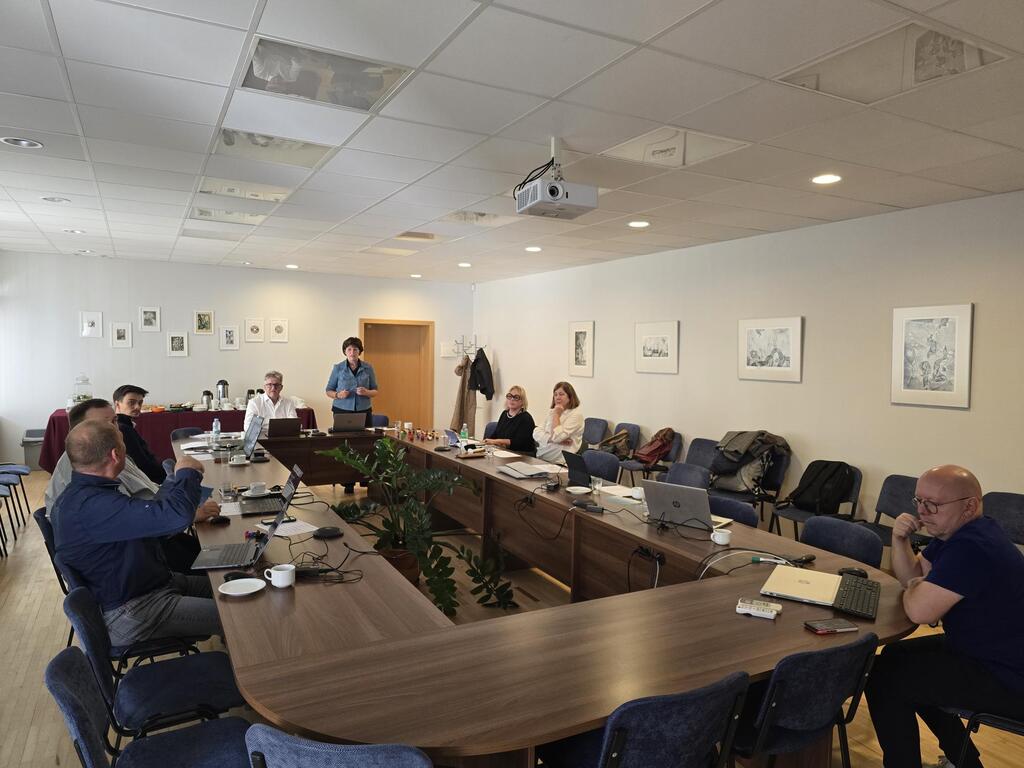
4th Partner Event - Lithuania
In the first days of October 2025, the four partners entities gathered in Vilnius, Lithuania, hosted by Vilnius University, for the final project meeting. During the event, each partner presented the training modules developed throughout the project. The session was open to the teaching and training commmunity of all partner organisatins, who joined both on-site and online. Participants had the opportunity to experience the modules firsthand and explore how these innovative tools can enhance hybrid and blended learning in vocational education. The meeting concluded with a discussion on the next steps to ensure that the outcomes of Hybrid Teaching Elevated continue to support educators and trainers across Europe.
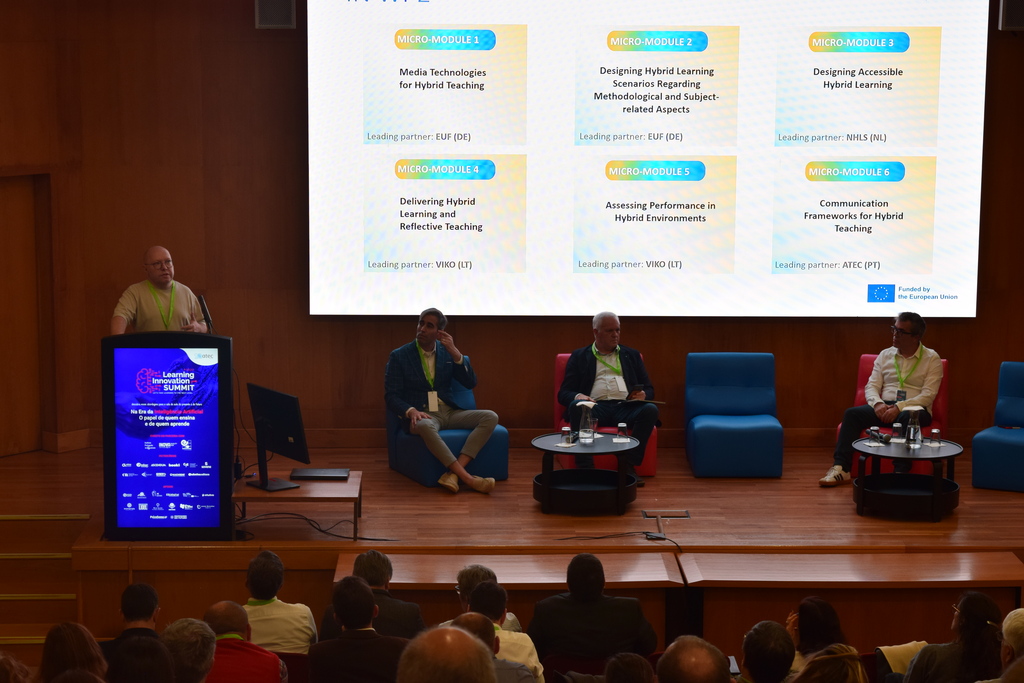
ATEC Learning Innovation Summit - 4th Edition
Learning Innovation Summit is an annual event organized by ATEC to promote pedagogical innovation in vocational education and training. The event brings together teachers, trainers, and educators eager to explore new approaches to learning. The 4th edition, held on November 30th, 2024, focused on the theme “In the Age of Artificial Intelligence. - the role of teachers and learners”. As part of the program, Andrejus Račkovskis, project manager, presented the advantages and potential of Hybrid Teaching.
The event also featured a hands-on lab, where participants had the opportunity to experiment innovative tools for creating hybrid learning experiences.
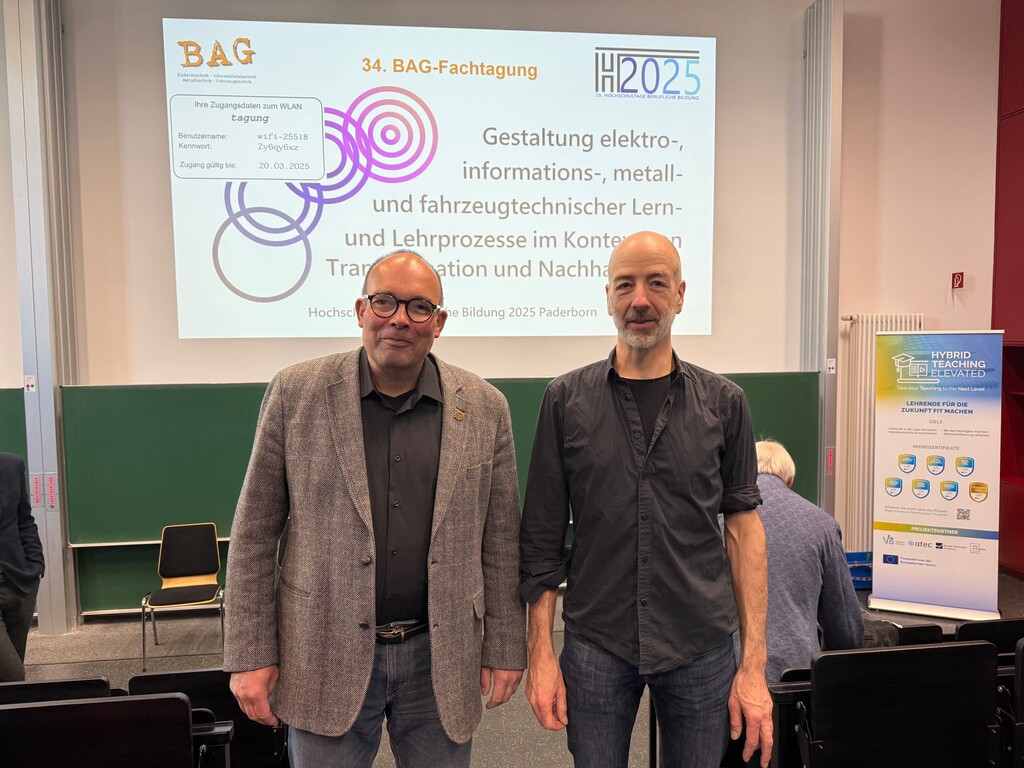
Vocational Education University Days - Germany
From 17 to 19 March 2025, the Hochschultage Berufliche Bildung took place in Paderborn (Germany). The Hochschultage Berufliche Bildung are held every two years in Germany at different locations with over 1,000 participants and are unique in Germany in this form and size.
The Higher Education Days for Vocational Education offered a variety of table sessions, one of which was organised by the vocational education cluster of the Schleswig-Holstein state programme ‘Future Schools in the Digital Age’. The content focused on the development of digital competence in teaching and learning processes in vocational education and training, with a particular emphasis on teacher training and continuing education. The modular training concept of Hybrid Elevate was presented as a practical example of contemporary and future-oriented teacher training and continuing education.
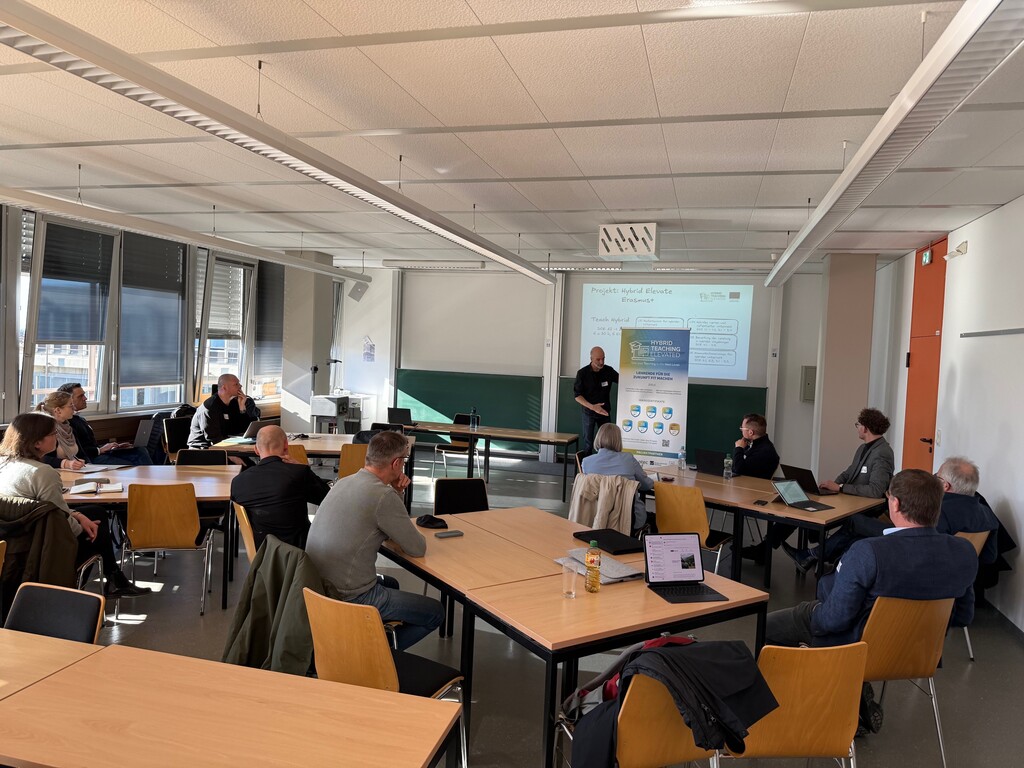
Hochschultage 2025 - Germany
Once again, biat was present at the Hochschultage 2025 in Paderborn. Nikolaus Steffen and Axel Grimm contributed to the topic ‘DigCompEdu in teacher training in the federal states and the resulting opportunities and challenges in commercial and technical teacher training’.
The ‘European Framework for the Digital Competence of Teachers’ (DigCompEdu) was published by the EU in 2017. In December 2021, the KMK adopted the guidance document on ‘Teaching and learning in the digital world: Supplement to the Strategy of the Standing Conference of the Ministers of Education and Cultural Affairs “Education in the digital world”’. This document states and stipulates (ibid., p. 24):
‘Based on DigCompEdu, the federal states will develop, if they have not already done so, a state-specific competence framework [for the initial and continuing training of teachers’ digital competences] that takes into account the specific conditions of the respective state as well as national and international compatibility, and will update this framework on an ongoing basis.’
Anyone looking around the federal states will notice that, despite the KMK requirement, DigCompEdu has hardly found its way into teacher training and continuing education. It should also be noted that DigCompEdu has not yet been discussed within the BAG or at its specialist conferences in recent years.
This conference paper began with a brief presentation of DigCompEdu, i.e. its 22 competences in six dimensions and six phases, from ‘beginner’ to ‘pioneer’. An insight into the state programme ‘Future Schools in the Digital Age’ of the state of Schleswig-Holstein was provided and the relevance of DigCompEdu for this programme was discussed.
Furthermore, DigCompEdu was specified in terms of the objectives of a current Erasmus+ project on hybrid learning. Subsequently, DigCompEdu was discussed specifically with regard to its integration into commercial and technical teacher training and further education. The aim, initiated by the BAG, was to form a cross-state community of practice on DigCompEdu in order to achieve the relevant KMK objectives.
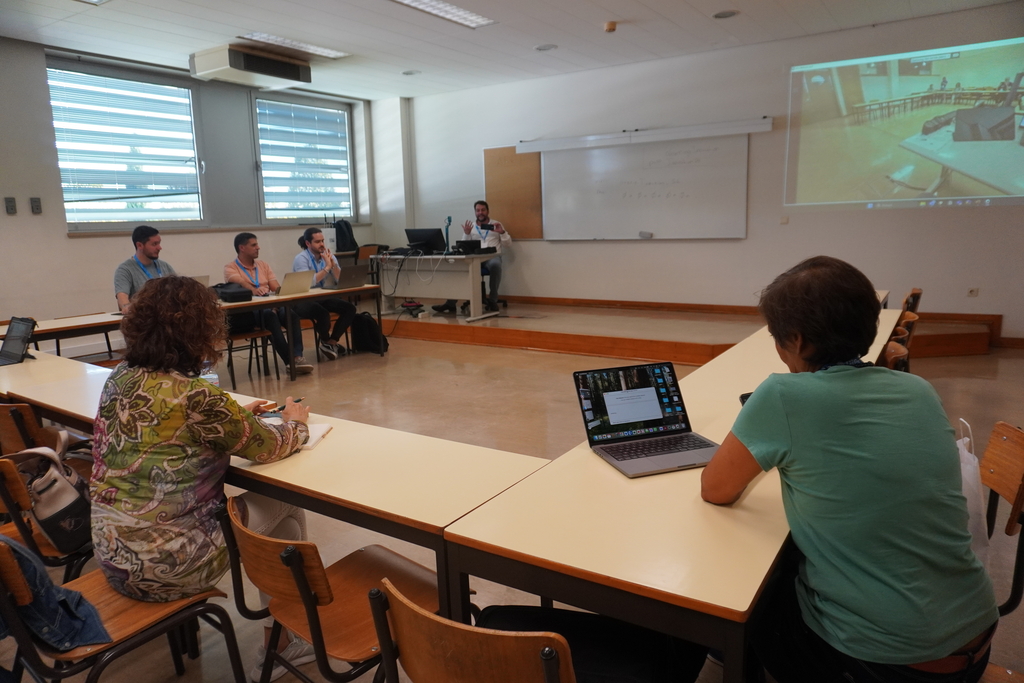
5th Learning Innovation Summit - Portugal
At the fifth edition of the Learning Innovation Summit, ATEC’s flagship event on educational innovation, Pedro Vasconcelos, member of the Hybrid Teaching Project, led an inspiring Learning Lab titled “Hybrid Teaching in High Definition – The Hybrid Teaching Elevated Project.”
In this hands-on session, accessible technology was turned into pedagogical superpowers. Participants discovered how to use OBS Studio to deliver high-quality live broadcasts, repurpose their smartphones as alternative cameras, and design immersive visual experiences using multiple screens.
The session also unveiled the creative potential of Microsoft PowerToys and demonstrated how the right lighting setup can transform any class — even without high-end gear.
Learning Innovation Summit took place on October, 11th, in the northern city of Maia in Portugal.